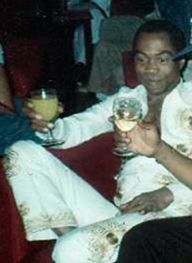
Fela Aníkúlápó Kuti, also known as Abami Eda, was a Nigerian musician, bandleader, composer, political activist, and Pan-Africanist. He is regarded as the King of Afrobeat, a Nigerian music genre that combines West African music with American funk and jazz. At the height of his popularity, he was referred to as one of Africa's most "challenging and charismatic music performers". AllMusic described him as "a musical and sociopolitical voice" of international significance.
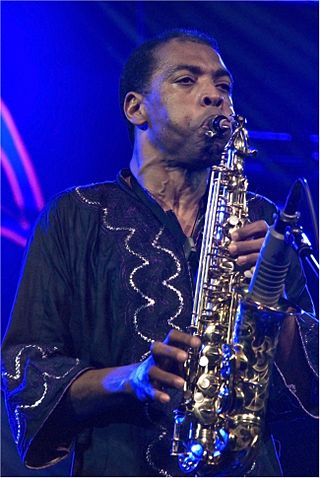
Olufela Olufemi Anikulapo Kuti, popularly known as Femi Kuti, is a Nigerian musician born in London and raised in Lagos. He is the eldest son of Afrobeat pioneer Fela Kuti and a grandchild of political campaigner, women's rights activist and traditional aristocrat Funmilayo Ransome-Kuti.

Tony Oladipo Allen was a Nigerian drummer, composer, and songwriter who lived and worked in Paris, France. Allen was the drummer and musical director of Fela Kuti's band Africa '70 from 1968 to 1979, and was one of the founders of the Afrobeat genre. Fela once stated that "without Tony Allen, there would be no Afrobeat". He was described by Brian Eno as "perhaps the greatest drummer who has ever lived".
Kalakuta Republic was the name musician and political activist Fela Kuti gave to the communal compound that housed his family, band members, and recording studio. Located at 14 Agege Motor Road, Idi-Oro, Mushin, Lagos, Nigeria, it had a free health clinic, and recording facility. Fela declared it independent from the state ruled by the military junta after he returned from the United States in 1970. The compound burned to the ground on February 18, 1977 after an assault by a thousand armed soldiers.

Waliou Jacques Daniel Isheola "Wally" Badarou is a French musician. Born in France with ancestry from Benin, West Africa, Badarou is known for his close association with the English group Level 42, and for his prolific work as a session musician with a wide variety of performers from around the world.
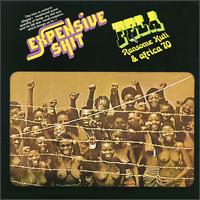
Expensive Shit is the twelfth full-length album by pioneering Afrobeat artist Fela Kuti and his Africa '70 band, released in 1975. It was reissued in 2000 by MCA Records, packaged with Kuti's He Miss Road (1975) on the same CD.

Knitting Factory Records is an independent American music label that is notable for promoting a variety of artists, including the music of deceased Nigerian political activist Fela Kuti. The label promotes a variety of music artists including Ages and Ages, Ash Black Bufflo, Cuong Vu, Graham Haynes, Femi Kuti, Gary Lucas, Lumerians, Thomas Chapin, Patrolled By Radar, Joe Morris, Rachid Taha, Seun Kuti, and Shilpa Ray and her Happy Hookers.

Chief Funmilayo Ransome-Kuti, MON, also known as Funmilayo Aníkúlápó-Kuti and Chief Funmi, was a Nigerian educator, political campaigner, suffragist, and women's rights activist.

Oluseun Anikulapo Kuti, popularly known Seun Kuti, is a Nigerian musician, singer and the youngest son of Afrobeat pioneer Fela Kuti. Seun leads his father's former band Egypt 80.
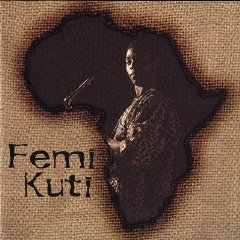
Femi Kuti is the third album by Nigerian musician Femi Kuti released in 1995. It was released on Motown's Tabu Records label. The album introduced Femi Kuti and afrobeat to an international audience.

Lemi Ghariokwu, also known simply as Lemi, is a Nigerian painter, illustrator and designer who is most renowned for providing many of the original cover images for the recordings of Nigerian musician Fela Kuti.

Bamidele Olatunbosun Sosimi known as Dele Sosimi, is a Nigerian-British musician.
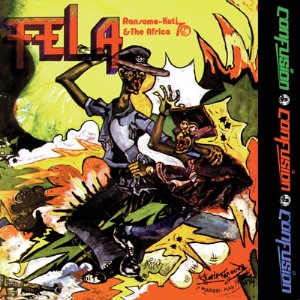
Confusion is a 1975 album by Nigerian Afrobeat musician Fela Kuti and his Africa 70 band. It was arranged, composed, and produced by Kuti, who recorded the album after choosing to emphasize his African heritage and nationalism in his music. Confusion is a commentary on the confused state of post-colonial Lagos and its lack of infrastructure and proper leadership at the time. Kuti's pidgin English lyrics depict difficult conditions in the city, including a frenetic, multilingual trading market and inextricable traffic jams in Lagos' major intersections.

Sorrow Tears and Blood is an album by Nigerian Afrobeat composer, bandleader, and multi-instrumentalist Fela Kuti recorded in 1977 and originally released on the Nigerian Kalakuta label.

Shuffering and Shmiling is an album by Nigerian Afrobeat composer, bandleader, and multi-instrumentalist Fela Kuti, recorded in 1977 and originally released on the Nigerian Coconut label.

Unknown Soldier is an album by Nigerian Afrobeat composer, bandleader and multi-instrumentalist Fela Kuti, recorded in 1979 and originally released on the Nigerian Skylark label.
Omoyeni 'Yeni' Anikulapo-Kuti is a dancer, singer and descendant of the Ransome-Kuti family. Her grandmother was Nigerian women's rights activist Funmilayo Ransome-Kuti. Anikulapo-Kuti pioneered the idea of Felabration, a music festival conceived to celebrate the life and contributions of her late father Fela Kuti to the Nigerian society.

Abeokuta Grammar School is a secondary school in the city of Abeokuta, Ogun State, Nigeria. It is currently located at Idi-Aba area, of Abeokuta. Often called the first grammar school in Nigeria, it is attended by students from all parts of Nigeria, the West Coast of Africa, South Africa, Europe and even Asia.

Army Arrangement is a 1985 studio album by Fela Kuti.

Beasts of No Nation is an album by the Nigerian musician Fela Kuti. It was released in 1989. Kuti is credited with his band Egypt 80.


















